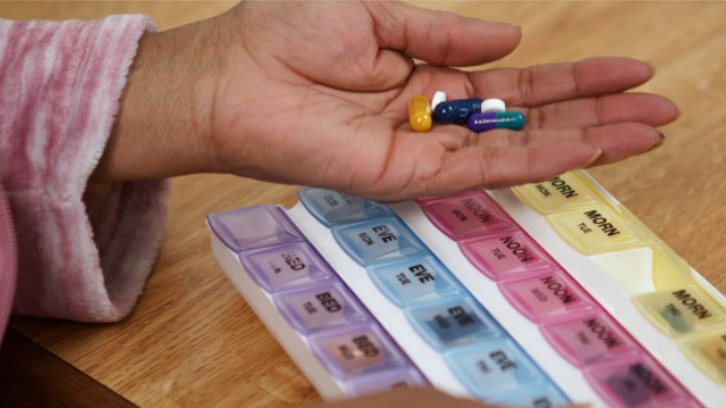Medication
Medication for Pulmonary Fibrosis
Drug therapy for pulmonary fibrosis is often specific for the type of PF a patient has. Due to differences in the causes of PF, a medication prescribed to treat one form of the disease may not be the right one for another form of the disease. It is important to discuss drug therapy with your physician to learn what medications may be appropriate to treat your form of pulmonary fibrosis. Some common therapies (but not all potential therapies) are listed below.


Nintedanib (OFEV®)
Nintedanib is an anti-fibrotic drug that is approved in the United States to treat idiopathic pulmonary fibrosis, scleroderma-associated ILD (SSc-ILD), and chronic interstitial lung diseases in which fibrosis continues to progress. In clinical trials,
nintedanib has been shown to slow the decline in lung function in SSc-ILD, progressive fibrosing ILD, and mild-to-moderate IPF. It is taken by mouth twice a day. For more information, please visit OFEV.com.
Pirfenidone (Esbriet®, Pirfenex®, Pirespa®)
Pirfenidone is an antifibrotic and anti-inflammatory drug approved to treat IPF in the US, Europe, Canada, Asia, and Australia. In clinical trials, pirfenidone has been shown to slow progression of mild-to-moderate idiopathic pulmonary fibrosis. It is taken by mouth three times a day. For more information, please visit esbriet.com. Visit Sandoz.com for information about generic pirfenidione.


Tocilizumab (Actemra®)
Corticosteroids (prednisone)
Prednisone is used to treat and prevent inflammation by weakening the immune system. While prednisone is not usually used to treat idiopathic pulmonary fibrosis, it is sometimes used to treat inflammation in the lungs of people living with other forms of pulmonary fibrosis. Since prednisone suppresses the immune system, it can potentially increase the frequency and severity of infections. Prednisone has many other side effects as well.


Mycophenolate mofetil/mycophenolic acid (CellCept®)
Similar to prednisone, mycophenolate mofetil (MMF) also can treat and prevent inflammation by suppressing the immune system. MMF is sometimes used in combination with prednisone, but is also used alone. MMF is not indicated for the treatment of IPF, but like prednisone can be used for people living with other forms of PF. Some possible side effects include infections, diarrhea, and low blood cell counts. Pregnant women should not take MMF, and women of childbearing age need to use contraception while taking MMF.
Azathioprine (Imuran®)
Azathioprine is used to suppress the immune system similarly to MMF. Some possible side effects include infections, low blood cell counts, and liver and pancreatic problems.Several other anti-inflammatory therapies such as methotrexate, cyclophosphamide, cyclosporine, rapamycin (sirolimus), and tacrolimus have been used to treat different forms of interstitial lung disease. As mentioned previously, treatment with these agents is often tailored to specific diseases or forms of ILD and pulmonary fibrosis.

Educational Materials
Find reliable information and trusted resources that can help you learn about pulmonary fibrosis and live better with PF.
-
View Full Details
Pulmonary Fibrosis Information Guide
Our comprehensive guide provides reliable information about pulmonary fibrosis, the diagnostic process, treatment options, and more. -
View Full Details
Pirfenidone Fact Sheet
Pirfenidone is an oral medication approved for the treatment of idiopathic pulmonary fibrosis by the U.S. FDA in 2014. Pirfenidone has been shown to slow the progression of IPF in clinical trials. Read our fact sheet to learn more. -
View Full Details
Nintedanib Fact Sheet
Nintedanib is an oral medication approved for the treatment of idiopathic pulmonary fibrosis, systemic sclerosis associated interstitial lung disease, and chronic interstitial lung diseases in which fibrosis continues to progress. Read our fact sheet to learn more.
